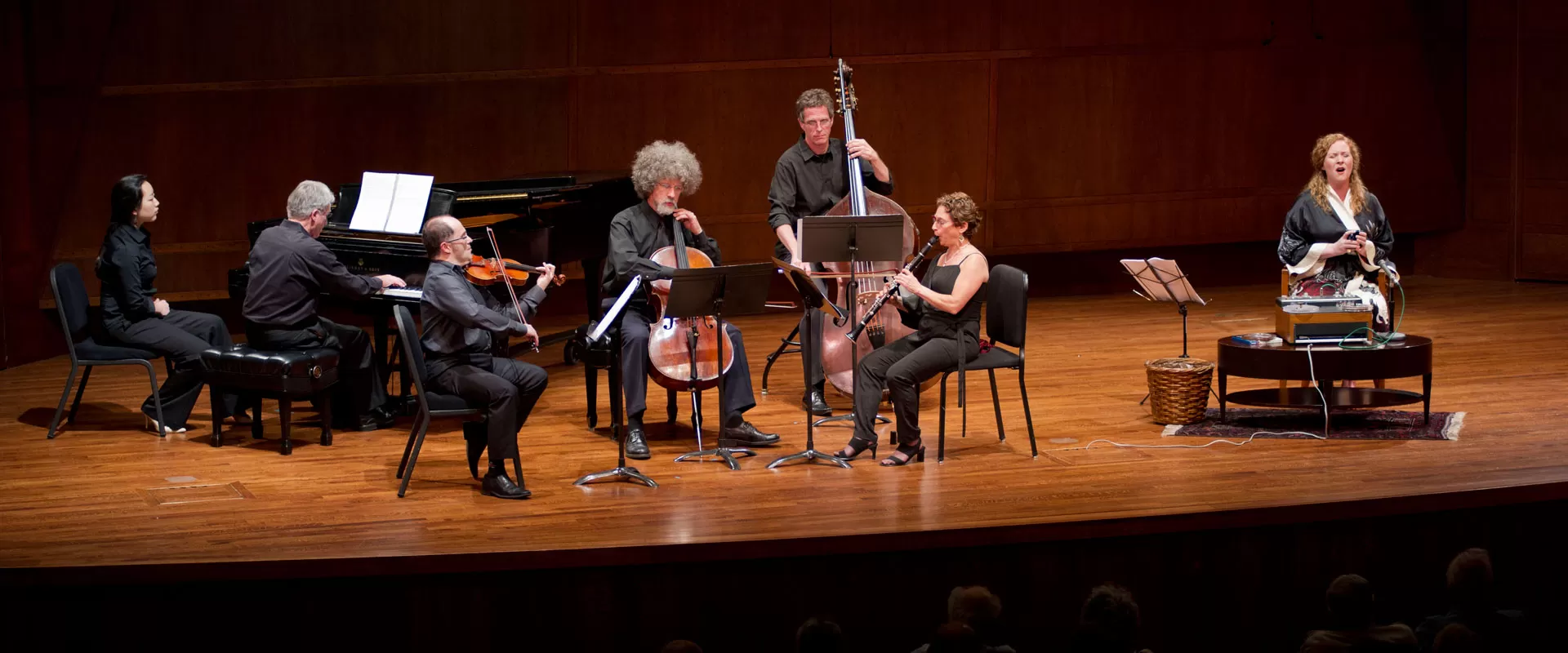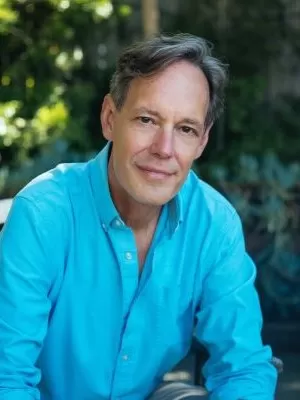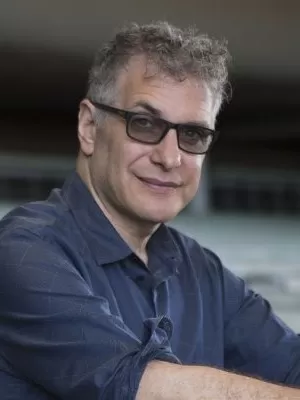May 12, 2012 - 12:00 pm
Our May 14, 2012, concert featured the world premiere of a commission from composer Jake Heggie and librettist Gene Scheer: Another Sunrise. Drawing on the life story of Polish Resistance member Krystyna Zywulska, the work explores the unimaginable choices Zywulska made in order to survive, to see another sunrise. The concert program also included Szymon Laks' String Quartet No. 3, Pavel Haas' Suite for Oboe and Piano, Op. 17; and the Northwest Boychoir singing Yiddish and Hebrew folk songs arranged by Viktor Ullmann in Terezín.
Excerpt from Another Sunrise
ABOUT THE MUSIC
String Quartet No. 3 (1945)
Szymon Laks (b. Warsaw, 1901–d. Paris, 1983)
Szymon Laks is perhaps best known for his book Music of Another World, an emotionally detached memoir of his personal experience as a “camp musician” during the Holocaust. Laks studied mathematics, musical composition, and conducting before leaving his native Poland to enter the Paris Conservatory in 1926. In Paris, he found work writing and directing music for the stage, film, and concert hall. Arrested by the Germans in 1941, Laks was deported as a Jewish foreign national, and spent three years in the concentration camps of Auschwitz, Sachsenhausen, and Dachau. At Auschwitz, Laks became the kappelmeister of the extermination camp’s band. Laks acknowledges that he survived through his musical assignments—writing and arranging music for performance, and directing the “camp” ensembles. His book, written in Paris in 1948, describes these experiences, and the grotesque phenomena of music among the crematoria of Auschwitz.
Music in Auschwitz served a different function from that in Terezín, the cynical combination of concentration camp and propaganda “show colony” where many of Europe’s talented composers and musicians were sent. However, at both of these camps—and at others—the Nazis used music in an attempt to camouflage the “final solution” awaiting their prisoners.
Laks’ account describes the troubling paradox of SS men who, he asserts, could reveal emotion evoked by a work of music, but none by their barbarous acts. The reader is left pondering the question: “Could people who love music to this extent, people who can cry when they hear it, be at the same time capable of committing so many atrocities on the rest of humanity?”
Lak’s third string quartet, subtitled “on Polish folk melodies,” was composed shortly after his liberation from Auschwitz. It is based on Polish folk melodies from various regions of the country. Polish music was strictly forbidden in Auschwitz, and performing it constituted a rebellious act. Ironically, Laks found some Polish melodies there, and proceeded to arrange them for chamber ensemble. In addition to twelve Polish folk melodies, the quartet contains a strong dance element, with the third movement in mazurka rhythm, and the last movement based on the rhythmic music of the Gorals (a district in the Tatra mountains).
Suite for Oboe and Piano, Op. 17 (1939)
Pavel Haas (b. Brno, 1899–d. Auschwitz, 1944)
Pavel Haas has been described as the most gifted student of Czech composer Leoš Janácěk. The son of a shoemaker, Haas did not begin his musical studies until his early teens, attending the music school of his hometown’s Philharmonic Society. After three years of army service, he joined the Conservatory and graduated to Janácěk’s master class, becoming a star pupil. Over two productive decades, Haas would work on over fifty compositions, but he gave opus numbers to only eighteen. His varied oeuvre includes symphonic and choral works, art songs, chamber music, scores for cinema and theatre, and an opera. Haas’ mature compositional voice combined a Stravinsky-like neo-Classicism with jazz, Czech folk themes, and Jewish synagogue music.
Haas composed the Suite for Oboe and Piano at the start of World War II, soon after the Nazi occupation of Czechoslovakia. The work is an eloquent celebration of national identity under assault, and it expresses an intense love of country by incorporating the melody of the St. Wenceslas chorale—the emblematic Czech musical symbol. Haas initially created it as a vocal composition, but later scored it for piano and oboe. The original text, a commentary on the Nazi invasion, has not been recovered.
Haas was deported to Terezín in 1941, where he joined fellow Czech Jewish composers Viktor Ullmann, Gideon Klein, and Hans Krása. It was Klein who gave Haas music paper and encouraged him to compose to resist the depression that threatened to overwhelm him. Knowing his likely fate, Haas had saved his non-Jewish wife and their daughter by divorcing. He was sent to his death at Auschwitz in October 1944.
Yiddish and Hebrew Folk Songs
Viktor Ullmann (b. Teschen, Silesia, 1898 – d. Auschwitz, 1944)
Like many other artists of the interwar years, Viktor Ullmann was a victim of Nazi racial policies. Although Ullmann played a prominent role in Prague’s musical life, and his works were highly admired, performances of his music were banned after the German invasion of Czechoslovakia in March 1939.
Ullmann was deported to Terezín on September 8, 1942. During his two years of incarceration there, he was at the center of Terezín’s intellectual and artistic life as a composer, organizer, lecturer, and writer. Ullmann’s prolific creativity, even during this horrific period, epitomizes the power of art as spiritual and psychological defiance, and his courage was an inspiration to many others. Ullmann wrote: “It must be emphasized that Theresienstadt has served to enhance, not to impede, my musical activities, that by no means did we sit weeping on the banks of the waters of Babylon, and that our endeavor with respect to the Arts was commensurate with our will to live.” On October 16, 1944, Ullmann was transported to Auschwitz, where he was murdered upon arrival.
Choral singing met an important need for the people in Terezín, whose talents ranged from amateur to accomplished professional levels. Almost immediately following the first transports to the camp, there was an interest in folksong arrangements that could be sung by amateur voices. Nothing in Ullmann’s earlier music suggested a Jewish awareness on his part. In Terezín, however, he made many arrangements of Jewish folk songs for both solo voice and choir. Ullmann took these Yiddish and Hebrew folk melodies from a Jewish Macabi Songbook printed in Berlin in 1930.
Of Jewish parentage, Ullman was raised a Catholic and later converted to Protestantism before returning to Catholicism. It is a tragic irony that he rediscovered his Jewish roots in a concentration camp.
Another Sunrise (2012)
Jake Heggie (b. West Palm Beach, FL, 1961)
Libretto by Gene Scheer
World Premiere, Commissioned by Music of Remembrance
Made possible by a generous gift from The Clovis Foundation, Mary Winton Green, Jonathan Green, and Brenda Berry
The Holocaust was an unspeakable tragedy, and nearly seventy years after the end of the Third Reich the world is still learning its countless stories. With the passage of time, it becomes too easy for us to reduce the individuals caught in its grasp to caricatures of tragic victimhood or heroic resistance. We forget that each of those people—the millions—was wrenched from everything they knew as normal, and thrown into an unfathomable hell where old rules lost their meaning. They lived or died not only through luck or circumstance, but also through anguished decisions they were forced to make in situations we cannot begin to comprehend.
At a 2007 international Holocaust conference in Krakow, Poland, I heard a paper by Swarthmore College professor Barbara Milewski about the Polish resistance fighter and hidden Jew, Krystyna Zywulska. It was immediately clear that this story called for Music of Remembrance to commission a work that would share Zywulska’s remarkable legacy through music.
Zywulska’s published memoirs vividly describe her courageous day-to-day fight for survival during the Nazi occupation of Poland. With her mother, she walked out of the Warsaw ghetto in broad daylight in 1942, and joined the Polish resistance. Captured by the Gestapo and sent to Auschwitz-Birkenau, she wrote satiric poems that became camp anthems of resistance. This was a dangerous notoriety, because she was still trying to hide her Jewish roots from camp informers.
Composer Jake Heggie and librettist Gene Scheer are the perfect team to create this musical drama. Over the past decade, many of Jake’s most important works have been inspired by stories of struggle for social justice and human dignity. He has an exceptional gift for capturing the depth of human experience with emotional and artistic honesty. Jake Heggie and Gene Scheer have been extraordinary collaborators, and Another Sunrise reflects their hearts as well as their genius.
We are grateful to Barbara Milewski for introducing us to Krystyna Zywulska’s life and work, and also to Bret Werb, musicologist at the United States Holocaust Memorial Museum, for his guidance. We offer special thanks, as well, to Krystyna’s son Tadeusz Andrzejewski for granting us permission to share his mother’s story with the world.
Jake Heggie and Gene Scheer offer the following remarks about Another Sunrise:
The woman we know today as the author and lyricist Krystyna Zywulska was a Holocaust survivor with an astonishing, complex, sometimes baffling history. Born Sonia Landau in 1914 to a Jewish family in Lódz, Poland, she was studying law at Warsaw University when World War II erupted. In 1941, she and her family were relocated to the Warsaw ghetto. One day, seeing a window of opportunity, Sonia and her mother bravely walked out of the ghetto in broad daylight, leaving her father behind. She adopted the name Sophia Wisniewska and worked for the underground resistance until she was arrested by the Gestapo in 1943. Refusing to name names to the Nazis, she changed her own name to Krystyna Zywulska (born in 1918 rather than 1914) and was sent to Auschwitz-Birkenau as a political prisoner—not as a Jew.
As a prisoner, with no experience as a writer, Krystyna crafted lyrics of protest and survival and set them to well-known folk tunes and popular melodies. Since it was suicide to write them down, her lyrics were passed along by word of mouth from inmate to inmate throughout the camp. A fellow inmate in a position of authority was moved by Krystyna’s work and decided to save the “camp poet.” After a year of disease, lice, and backbreaking labor in the fields, Krystyna was given one of the few choice jobs inside the Effektenkammer (warehouse of personal effects).
Here, she and her co-workers took inventory and took charge of the possessions that thousands upon thousands of Jewish women and children from all over Europe brought with them to the camp. Often, once their possessions had been taken and catalogued, these prisoners were marched next door to the ovens for execution. Krystyna heard the screams and cries, saw the smoke, smelled the stench, and had to live in an almost unimaginable situation: to survive, she had to take and catalogue the personal belongings of Jewish women and children, then hear them murdered next door.
At the end of the war, during a death march when the camp was being evacuated, Krystyna once again escaped and survived. After the war, she chronicled the atrocities she witnessed in a startlingly candid memoir, I Came Back (also titled I Survived Auschwitz), published in 1946. However, she still did not claim her Jewish identity or ancestry. In the book, one feels strongly that Krystyna wanted to explain what happened without holding back.
The book is honest, revealing and profoundly moving. It also, curiously, compels one to wonder about the nature of memory and the parts of the past that remain in the shadows despite one’s best efforts. It is those shadows, those empty places, Another Sunrise explores.
Krystyna Zywulska died in 1993, having reclaimed her Jewish identity in the 1960s. Late in her life, she was interviewed by Professor Barbara Engleking for her book Holocaust and Memory (published in Polish in 1994 and English in 2001). In Zywulska’s responses to Engleking’s questions, one can sense her frustration in trying to find language that might adequately describe the enormity of what happened, or the extraordinary complexity in a fog of memories.
In that interview, a woman whose words had saved her life now struggles to find words to describe what happened. It is this irony that prompted the idea for Another Sunrise.
Of course, it is not that she couldn’t find words: it is that none could ever truly describe what she and millions of others experienced. The past is thus clouded not by a lack of willingness to define what happened, but rather by the limits of language itself. Like the uncertainty principal that governs the quantum heart of the world, history too seems to be ruled by immutable paradoxes. If you measure something, you change it. If you describe something, you change it as well—even the past.
Another Sunrise is about the struggle to describe harrowing, unimaginable situations to people who weren’t there. It is also about what it is to survive. Like many who make it through a war, Krystyna survived not through grand acts of heroism, but through near maddening acts of survival. We do whatever it takes to live another day: to see another sunrise.
We thank Mina Miller for bringing Krystyna Zywulska’s story to our attention and for giving us the opportunity to create another new work for Music of Remembrance. Another Sunrise is lovingly dedicated to Mina, who reminds us all what it is to remember.
About the Composer & Librettist
Jake Heggie, composer, was born in West Palm Beach, Florida; raised in Ohio and California; and has made his home in San Francisco since 1993. Heggie’s most popular operas include the acclaimed Moby-Dick (libretto: Gene Scheer), The End of the Affair (libretto: Heather McDonald), and Dead Man Walking (libretto: Terrence McNally). His previous Music of Remembrance commission was 2007’s For a Look or a Touch (libretto: Scheer). He has written more than 200 songs, as well as orchestral, choral and chamber music. Heggie has had his operas performed internationally on five continents, and by more than a dozen American opera companies, including: San Francisco Opera, New York City Opera, Houston Grand Opera, The Dallas Opera, Seattle Opera, Ft. Worth Opera, Cincinnati Opera, Pittsburgh Opera, Austin Lyric Opera, and Madison Opera. His next opera, Great Scott, commissioned by Dallas Opera with story and libretto by McNally, will have its premiere in 2015/16. Recordings of Heggie’s compositions include PASSING BY: Songs by Jake Heggie (Avie), Dead Man Walking (Erato), Three Decembers (Albany), Flesh and Stone (Americus), To Hell and Back (Magnatune), The Faces of Love (RCA Red Seal), The Deepest Desire (Eloquentia), and MOR’s For a Look or a Touch (Naxos).
Gene Scheer, librettist, previously collaborated with Jake Heggie on the MOR-commissioned For a Look or a Touch, as well as the operas Moby-Dick and Three Decembers, lyric drama To Hell and Back, and the song cycles “Statuesque” and “Rise and Fall.” In February 2012, the Alexander Quartet and Joyce Di Donato gave the premiere of Heggie and Scheer’s Camille Claudel: Into the Fire. Scheer and composer Jennifer Higdon are working on an operatic adaptation of the novel Cold Mountain for the Santa Fe Opera. He wrote the libretto for the children’s opera The Star Gatherer with composer Stephen Paulus, and was the librettist for Tobias Picker’s An American Tragedy, which had its premiere at the Metropolitan Opera. The Chandos recording of their first collaboration, the opera Therèse Raquin, was cited by Opera News as one of the ten best recordings of 2002. Scheer’s own compositions have been performed by artists including Renee Fleming (with Christoph Eschenbach), Denyce Graves, Sylvia Mcnair, Stephanie Blythe, Jennifer Larmore, and Nathan Gunn. Norah Jones sang Scheer’s “American Anthem” in Ken Burns’ The War.
About Music notes by Mina Miller. Copyright 2012 Music of Remembrance



